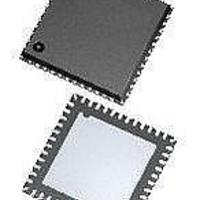MC9S08JM16CGT Freescale Semiconductor, MC9S08JM16CGT Datasheet - Page 260

MC9S08JM16CGT
Manufacturer Part Number
MC9S08JM16CGT
Description
MCU 8BIT 16K FLASH 48-QFN
Manufacturer
Freescale Semiconductor
Series
HCS08r
Datasheet
1.DEMO9S08JM16.pdf
(386 pages)
Specifications of MC9S08JM16CGT
Core Processor
HCS08
Core Size
8-Bit
Speed
48MHz
Connectivity
I²C, LIN, SCI, SPI, USB
Peripherals
LVD, POR, PWM, WDT
Number Of I /o
37
Program Memory Size
16KB (16K x 8)
Program Memory Type
FLASH
Ram Size
1K x 8
Voltage - Supply (vcc/vdd)
2.7 V ~ 5.5 V
Data Converters
A/D 8x12b
Oscillator Type
External
Operating Temperature
-40°C ~ 85°C
Package / Case
48-QFN Exposed Pad
Processor Series
S08JM
Core
HCS08
Data Bus Width
8 bit
Data Ram Size
1 KB
Interface Type
I2C, SPI
Maximum Clock Frequency
48 MHz
Number Of Programmable I/os
37
Number Of Timers
2
Operating Supply Voltage
2.7 V to 5.5 V
Maximum Operating Temperature
+ 85 C
Mounting Style
SMD/SMT
3rd Party Development Tools
EWS08
Development Tools By Supplier
DEMOJM, DEMOJMSKT, DEMOFLEXISJMSD, DEMO9S08JM16
Minimum Operating Temperature
- 40 C
On-chip Adc
12 bit, 8 Channel
Controller Family/series
HCS08
No. Of I/o's
37
Ram Memory Size
1KB
Cpu Speed
48MHz
No. Of Timers
2
Digital Ic Case Style
QFN
Rohs Compliant
Yes
Lead Free Status / RoHS Status
Lead free / RoHS Compliant
Eeprom Size
-
Lead Free Status / Rohs Status
Lead free / RoHS Compliant
Available stocks
Company
Part Number
Manufacturer
Quantity
Price
Company:
Part Number:
MC9S08JM16CGT
Manufacturer:
PIXART
Quantity:
1 001
Part Number:
MC9S08JM16CGT
Manufacturer:
FREESCALE
Quantity:
20 000
- Current page: 260 of 386
- Download datasheet (8Mb)
Serial Peripheral Interface (S08SPI16V1)
In the special case where the SPI is in master mode and MODFEN bit is cleared, the SS pin is not used by
the SPI. In this special case, the mode fault error function is inhibited and MODF remains cleared. In case
the SPI system is configured as a slave, the SS pin is a dedicated input pin. Mode fault error doesn’t occur
in slave mode.
If a mode fault error occurs the SPI is switched to slave mode, with the exception that the slave output
buffer is disabled. So SPSCK, MISO and MOSI pins are forced to be high impedance inputs to avoid any
possibility of conflict with another output driver. A transmission in progress is aborted and the SPI is
forced into idle state.
If the mode fault error occurs in the bidirectional mode for a SPI system configured in master mode, output
enable of the MOMI (MOSI in bidirectional mode) is cleared if it was set. No mode fault error occurs in
the bidirectional mode for the SPI system configured in slave mode.
The mode fault flag is cleared automatically by a read of the SPI Status Register (with MODF set) followed
by a write to SPI Control Register 1. If the mode fault flag is cleared, the SPI becomes a normal master or
slave again.
15.4.9
15.4.9.1
In run mode with the SPI system enable (SPE) bit in the SPI control register clear, the SPI system is in a
low-power, disabled state. SPI registers can still be accessed, but clocks to the core of this module are
disabled.
15.4.9.2
SPI operation in wait mode depends upon the state of the SPISWAI bit in SPI Control Register 2.
260
•
•
If SPISWAI is clear, the SPI operates normally when the CPU is in wait mode
If SPISWAI is set, SPI clock generation ceases and the SPI module enters a power conservation
state when the CPU is in wait mode.
— If SPISWAI is set and the SPI is configured for master, any transmission and reception in
– If SPISWAI is set and the SPI is configured as a slave, any transmission and reception in
progress stops at wait mode entry. The transmission and reception resumes when the SPI exits
wait mode.
progress continues if the SPSCK continues to be driven from the master. This keeps the slave
synchronized to the master and the SPSCK.
If the master transmits data while the slave is in wait mode, the slave will continue to send out
data consistent with the operation mode at the start of wait mode (i.e., if the slave is currently
sending its SPIxDH:SPIxDL to the master, it will continue to send the same byte. Otherwise,
if the slave is currently sending the last data received byte from the master, it will continue to
send each previously receive data from the master byte).
Low Power Mode Options
SPI in Run Mode
SPI in Wait Mode
MC9S08JM16 Series Data Sheet, Rev. 2
Freescale Semiconductor
Related parts for MC9S08JM16CGT
Image
Part Number
Description
Manufacturer
Datasheet
Request
R
Part Number:
Description:
Manufacturer:
Freescale Semiconductor, Inc
Datasheet:
Part Number:
Description:
Manufacturer:
Freescale Semiconductor, Inc
Datasheet:
Part Number:
Description:
Manufacturer:
Freescale Semiconductor, Inc
Datasheet:
Part Number:
Description:
Manufacturer:
Freescale Semiconductor, Inc
Datasheet:
Part Number:
Description:
Manufacturer:
Freescale Semiconductor, Inc
Datasheet:
Part Number:
Description:
Manufacturer:
Freescale Semiconductor, Inc
Datasheet:
Part Number:
Description:
Manufacturer:
Freescale Semiconductor, Inc
Datasheet:
Part Number:
Description:
Manufacturer:
Freescale Semiconductor, Inc
Datasheet:
Part Number:
Description:
Manufacturer:
Freescale Semiconductor, Inc
Datasheet:
Part Number:
Description:
Manufacturer:
Freescale Semiconductor, Inc
Datasheet:
Part Number:
Description:
Manufacturer:
Freescale Semiconductor, Inc
Datasheet:
Part Number:
Description:
Manufacturer:
Freescale Semiconductor, Inc
Datasheet:
Part Number:
Description:
Manufacturer:
Freescale Semiconductor, Inc
Datasheet:
Part Number:
Description:
Manufacturer:
Freescale Semiconductor, Inc
Datasheet:
Part Number:
Description:
Manufacturer:
Freescale Semiconductor, Inc
Datasheet:











